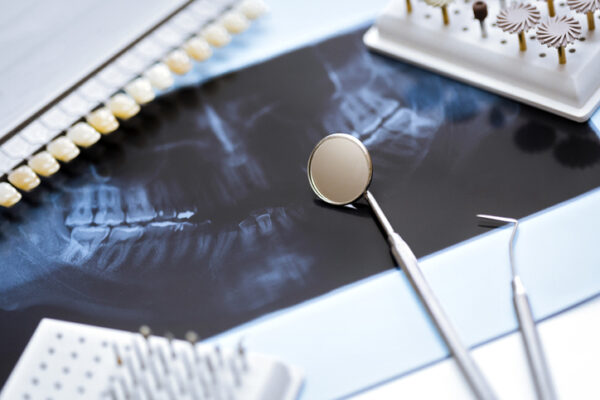
The US has some of the worst maternal health outcomes among developed countries in the world, and while the maternal mortality rate is declining, wide disparities in poor maternal health outcomes remain. As health care leaders look to address this crisis, one area that can’t be ignored is the connection between oral health and overall health. We must focus on increasing investment in medical-dental integration and improving oral health education to advance holistic maternal care.
Oral health’s impact on maternal health outcomes
Although nearly 60-75% of pregnant people in the US suffer from gingivitis, recent reports show that during pregnancy, only 46% receive dental cleanings. Pregnancy can increase the risk of gingivitis, tooth mobility, and dental caries, which, when left untreated can lead to periodontitis, a later stage of gum disease that can heighten the chances of low birth weight or even preterm birth. In the mouth, periodontal disease, marked by a host of pathogenic bacteria in the oral microbiome, causes irreversible destruction of the supporting structures of the teeth, including bone, and soft tissue. The oral microbiome changes throughout an individual’s pregnancy, and oral microbiome may cross the maternal-fetal barrier, with positive identification in placental material and amniotic fluids. For the mother, when left untreated, periodontitis can lead to negative systemic health outcomes like hypertension, even post-birth.
The consequences of poor oral health can impact multiple generations – one study found that a pregnant patient’s oral health affects their child’s oral health in adulthood. Children of mothers who had poor oral health were found to have poorer oral health relative to their mothers 27 years later. Driving awareness of the many factors impacting maternal health and prioritizing critical, everyday preventive actions — like getting proper nutrition and brushing teeth twice a day for two minutes during pregnancy — is critical to improving health outcomes for moms, babies, and the next generation.
Improving oral hygiene access and education for expectant parents
Today, oral health is siloed in health care, and this disconnect has increased gaps in overall patient care. For example, patients in underserved communities typically experience the highest rates of poor outcomes due to demographic, social, and economic barriers. It’s these barriers that directly impact maternal health outcomes for pregnant parents and parents-to-be in these communities. Moreover, with oral health treated as a separate entity, most dental insurance is detached from traditional health insurance. The consequences are two-fold: not everyone can afford or access oral health insurance and care, and there’s a lack of education about oral health’s impact on overall health – further widening disparities and knowledge gaps.
Since the mouth is a key entry point for disease, ensuring pregnant people understand its role in their well-being is necessary to set their, and their baby’s, health up for success. Improving patient education is a critical first step to closing these gaps. Health care leaders should establish programs that inform communities about how poor oral health hygiene increases risks for numerous health concerns, especially during pregnancy. Furthermore, education regarding maternal, infant, and early childhood oral health should start as early as possible and include the entire family or expected care team. Meeting patients where they are by launching these programs within primary care and OB-GYN settings can drive targeted awareness so that at-risk individuals have the knowledge needed to proactively seek care.
Alongside an educational framework, oral health providers should also explore preventive technology innovations that can lead to improved oral health outcomes and close accessibility gaps. Innovations like teledentistry, saliva tests that help with proactive detection, smart toothbrushes that ensure optimized brushing, intraoral cameras, and other solutions which provide remote access to oral health coaches and virtual dentists can monitor pregnant patients’ health. These innovations can also piece together the impact that oral care routines have on pregnant patients’ health during and post-pregnancy. Focusing on preventive initiatives and driving both oral health access and educational efforts are key to moving the needle in maternal and perinatal health outcomes.
Investing In oral and maternal health
Beyond patient education, investing in solutions that accelerate a more accessible, equitable, and integrated health system is critical. New oral health technologies can help reach this population better and provide care that can improve their health outcomes, making infusing capital into the oral health space essential. While women’s health investment increased by 314% between 2018 and 2023, many of these solutions unfortunately do not include or focus on oral health. Moreover, oral health funding continues to fall drastically behind investment in the overall health care space — according to a Crunchbase analysis, in 2023 less than $200 million in funding was raised by US dental startups compared to almost $17 billion raised by US health care startups.
By increasing funding for holistic health innovations inclusive of oral health, providers can reach underserved communities that traditionally face barriers to receiving routine, proper oral health care. One way to drive investment efforts in this space is for provider groups, payors, policymakers, investors, and other stakeholders to collaborate in accelerating integrated health innovation. Improving data-sharing across dental and traditional medical providers can also improve patient outcomes and ensure holistic patient data is considered when building solutions. Through building and engaging in these collaborative partnerships, leaders can better validate solutions in real-world settings and expand them to broader populations.
Actionable next steps to improve maternal health outcomes
As the world continues to piece together oral health’s influence on the body’s overall well-being, maternal health, and pregnancy outcomes can’t be overlooked. To best do this, leaders and stakeholders in the dental and medical spaces must implement educational programs and partner with payors, providers, and innovators to develop and adopt solutions that clinically improve outcomes. Broader system changes, like changing payment models and incentives, and moving toward value-based care, will also help to improve oral health and interconnected care.
Leaders and innovators across the healthcare continuum should break out of industry silos and come together to treat health through a unified, holistic approach. This starts with viewing specialties such as oral health, maternal health, endocrinology, and cardiology — among others — as interconnected practices, not as separate areas. It also requires combining education, innovation, and investment to truly see — and feel — positive change and interconnected care. In today’s oral health access climate, the health of moms, moms-to-be, and the next generation of children is at stake. By creating an encompassing, unified health care system, we can create healthier and brighter futures for all.
Picture: Nastasic, Getty Images
Katie D’Amico is a mission-driven, health care leader with over a decade of experience identifying, operationalizing, and scaling transformative solutions to some of the industry’s most complex challenges, across digital, women’s, and oral health. In her current role leading CareQuest Innovation Partners – the for-profit arm of CareQuest Institute, the world’s largest oral health non-profit – Katie is advancing the critical mission to make oral health more integrated, accessible, and equitable for all through accelerating innovation and medical-dental integration across the health ecosystem. From partnering with Fortune 100 companies and innovative startups to leading the team that convenes a global ecosystem via the SMILE Health accelerator, and contributing to her Chicagoland community, she has touched millions of lives and remains committed to improving the overall health care system.
Dr. Carolyn Brown, DDS, MEd is a growth and strategy-focused healthcare executive, with deep experience across the dental and software industries. Dr. Brown is the Strategic Advisor to MouthWatch, Dentistry.One, several venture capital health tech funds and is the Dental Director of the Health Plan of San Mateo. She is considered a subject matter expert on women’s health, perinatal oral health, alternative payment models and medical-dental integration.
This post appears through the MedCity Influencers program. Anyone can publish their perspective on business and innovation in healthcare on MedCity News through MedCity Influencers. Click here to find out how.











